- Pringle: We need a policy that recognises the importance of inshore fishing
- Pringle: Disabled people and carers face crisis of State neglect
- Pringle: Failed FF/FG housing policies forcing people to put their lives on hold
- Pringle welcomes Donegal council motion on Occupied Territories Bill: ‘We cannot stand by in the face of genocide’
Pringle: Big polluters need to pay more in climate change work
- Updated: 2nd May 2021

Independent TD for Donegal, Thomas Pringle, said Government must stop blaming the general population for the pollution caused by richer, wealthier polluters.
Resuming his comments in the Dáil today on Climate Action and Low Carbon Development (Amendment) Bill 2021, Deputy Pringle said climate action campaigns have been fairly middle class, with many measures targeting the working class and people with less money.
He noted that in a discussion earlier this month about the need to halve emissions in transport, Minister Eamon Ryan suggested that very cheap flights will end.
Deputy Pringle said: “In my opinion it is not the person or family who travel for a sun holiday on a special low-cost flight that are causing the most damage to the climate. Why should they be deprived of an opportunity to travel when there can be businesspeople travelling all over very regularly?
“Why can’t flight costs be linked to a person’s air miles? The more you fly, the more you pay, because the more you are contributing to aviation emissions. The less frequent fliers are those who can least afford to travel so why should they be punished?”
He said, for example, a person who can afford three holidays per year should be charged more for that privilege.
Deputy Pringle said: “If you are travelling for business, then it becomes just another expense. If you are travelling for pleasure then you can afford to pay more, and if you are privately jetting around the place then you should have huge levies and contributions to make.
“It is complete snobbery to suggest that it is the low-cost flights that are causing more damage to the environment.” Deputy Pringle said the bill does not even cover international aviation and shipping.
The deputy also expressed support for an online petition initiated by grassroots activists that call on Ireland to propose a global ban on fracking at the United Nations, on the grounds of climate mitigation, public health, environmental protection and human rights.
Deputy Pringle said: “This is a measure that the 2020 Programme for Government and widespread public opinion support, and that scientific evidence shows increasingly to be necessary. A call for a global ban on fracking would set Ireland on course to become a global climate leader.”
He said: “I was on the Climate Committee when Professor Robert Howarth explained that importing fracked gas would leave a carbon-equivalent footprint at least 44% greater than importing coal over a 20-year period. True climate action is about looking at the true climate impact of our decisions. We need victories against the fossil-fuel sector to bring the people along in this journey.”



